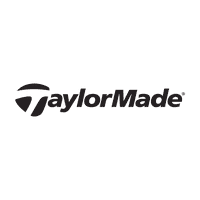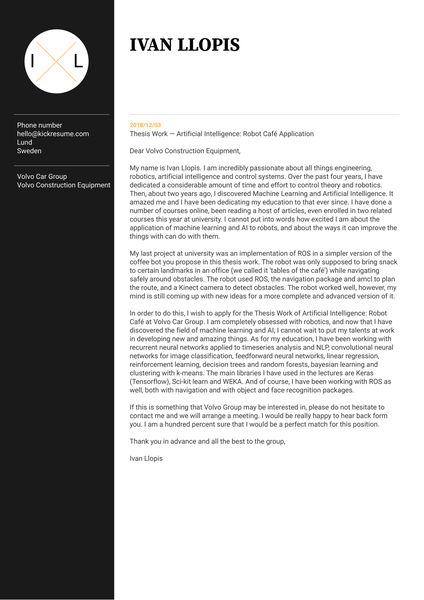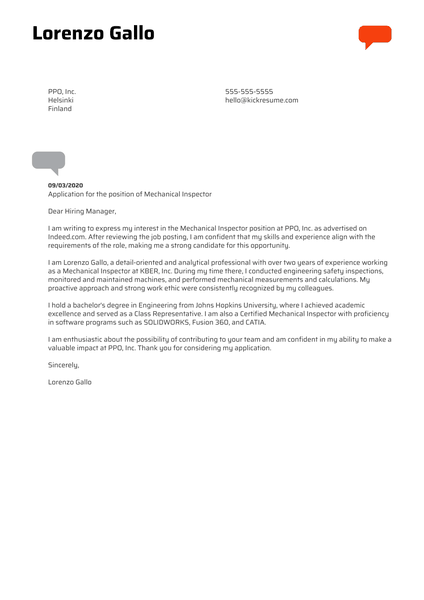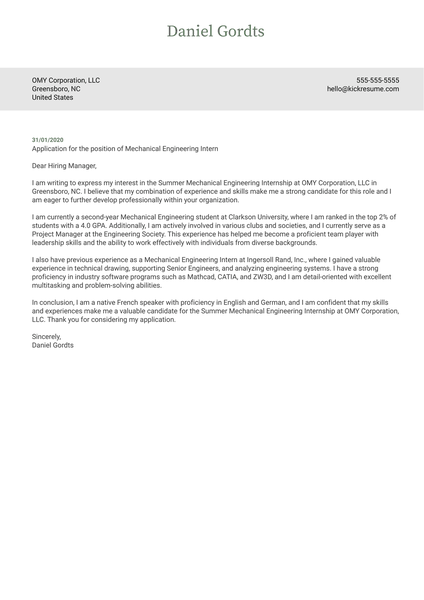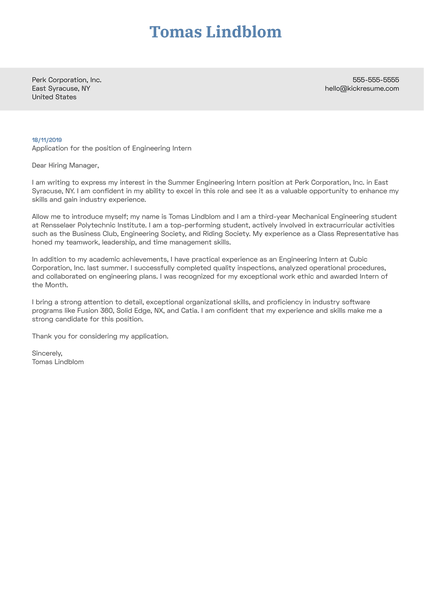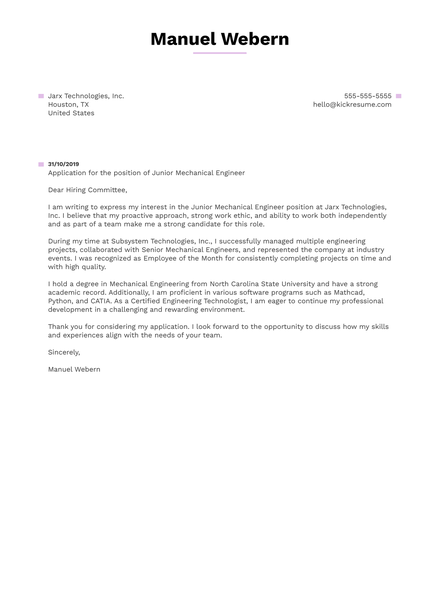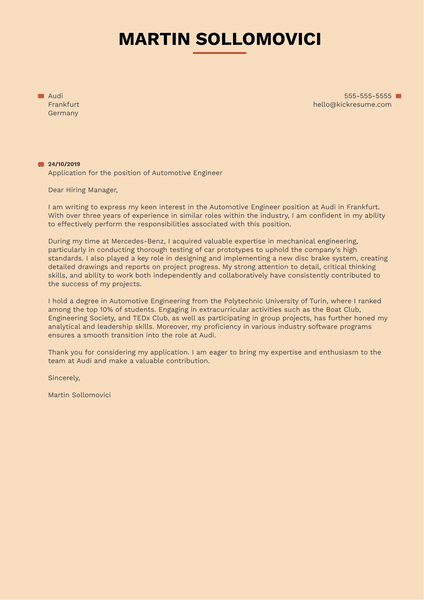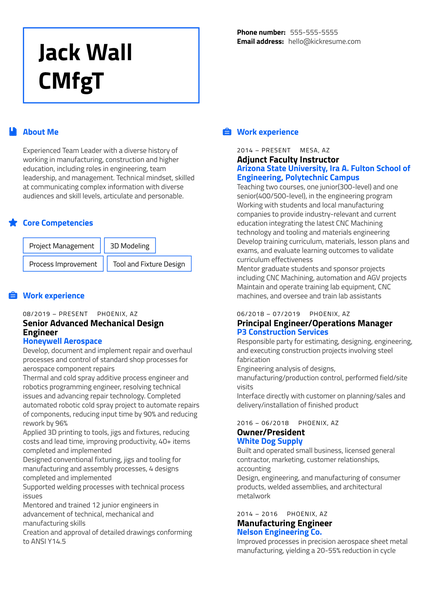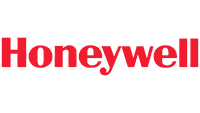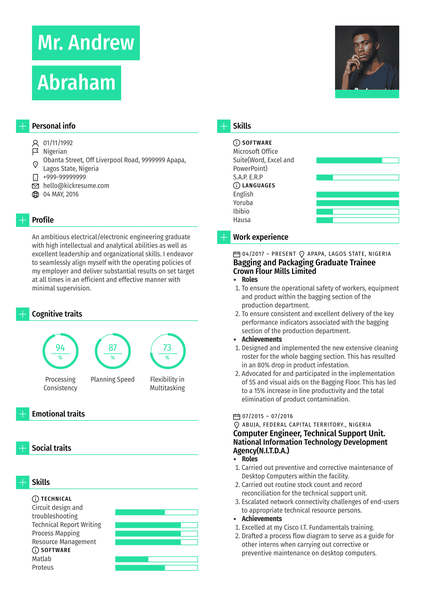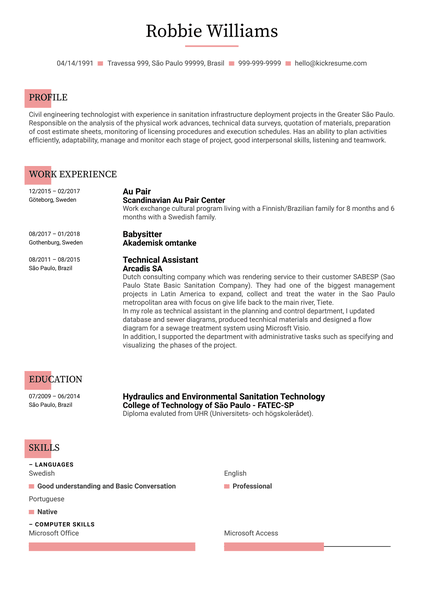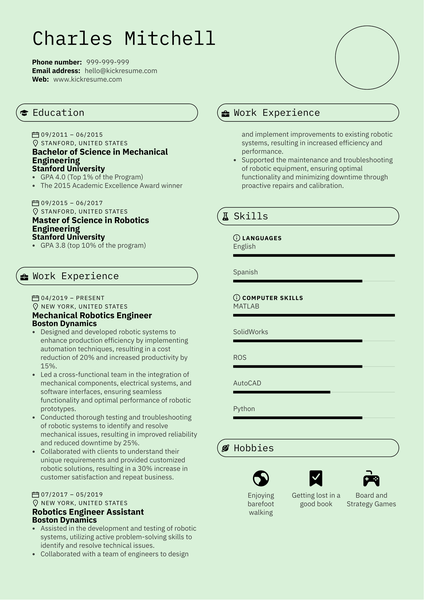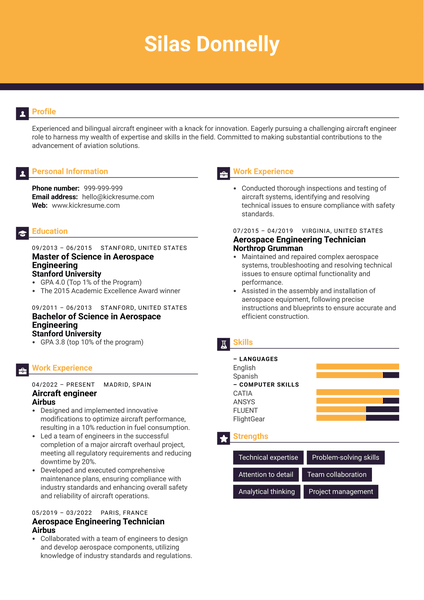Nailing your mechanical engineer cover letter is a lot like building a well-oiled machine: a bit of elbow grease and the right tools can make a world of difference.
Our guide will walk you through handy tips, real-life examples, and compelling templates to help you construct a cover letter that won’t end up in the reject pile.
And so, keep on reading and learn all about:
- Properly formatting your mechanical engineer cover letter
- Creating an effective header for your cover letter
- Crafting a compelling headline for your mechanical engineer cover letter
- Personalizing the greeting of your cover letter
- Writing a catchy introduction for your mechanical engineer cover letter
- Highlighting your engineering skills and achievements
- Framing a persuasive conclusion for your cover letter
- Avoiding common mistakes in a mechanical engineer cover letter
- Understanding average salary and job outlook for mechanical engineers
- Engineering resources for job seekers
1. How to properly format your mechanical engineer cover letter
Formatting is not unique to CAD systems — your mechanical engineer cover letter needs it too. When your cover letter format is neat, it's smooth to read and easy for the recruiter to navigate.
The key to proper formatting is consistency, clear communication and ease of reading. Here are some handy general formatting tips to keep your cover letter in shape:
- Length: The sweet spot for a cover letter is a single page. Just like efficient machine design, condense your skills, achievements, and motivations into a compact package.
- Margins and spacing: Use standard one-inch margins on all sides. This gives your cover letter a clean, professional look. It's like safety distances in mechanical design: necessary and practical. For spacing, have consistent spaces between sections, typically one line gap.
- Font: Opt for professional, easy-to-read fonts. Your cover letter is no place for fancy typography. Times New Roman, Arial, or Calibri in 10-12pt size are safe bets.
- Proper structure: Every cover letter should include the following sections: introduction, body, and conclusion. In the introduction, get right to the point. State why you’re writing the cover letter and what position you’re applying for. The body should highlight your experiences and skills relevant to the job. And in your conclusion, persuade the reviewer why you're the right fit for the role.
- Alignment: Align your text to the left. It helps in easy reading and looks organized.
Remember, your mechanical engineer cover letter should be a well-structured document that demonstrates your attention to detail, just as you would in your professional work.
2. How to create an effective header for your cover letter
Your cover letter's header may seem like a small detail, but it actually serves a crucial function. It carries key contact information, and getting it right matters for both you and your potential employer.
So what exactly should an effective header contain?
- Your name
- Your address
- Your phone number
- Your email address
- Your LinkedIn profile link (optional)
- The date
- The recipient’s name
- Their title
- Company name
- Company address
Doing a bit of research to find out who’s going to read your letter does wonders. Addressing the reader directly adds a personal touch and shows you've genuinely invested time.
Now, let's illustrate with examples tuned for a Mechanical Engineer role.
Bad cover letter header example
John Doe | 123 Apple Lane | johndoe@yahoo.com | 555-555-5555
Why does it fall flat? This header has the basics like name, email, and phone number, but it's falling short on specifics. We don't see any date. More importantly, it lacks the reader’s information which can make your cover letter look more personal and professionally-tailored. This could be perceived as a missed opportunity to show interest and initiative.
Good cover letter header example
John Doe | Chicago, IL 60402 | johndoe@yahoo.com | LinkedIn: www.linkedin.com/in/johndoe | 555-555-5555
November 2, 2022
To: Ms. Jane Smith
Hiring Manager
Mechanical Systems Inc.
Chicago, IL 60403
Why does it work? Now, this is a well-rounded header. Name, address, email, phone number, and even LinkedIn profile — all boxes checked. Moreover, the inclusion of the date and the recipient's details demonstrates a well-thought-out approach. Not only does it look professional, but it also shows respect for the reader's time.
This simple yet crucial part of your cover letter can set the stage for your application. So don't rush it, take your time, make it count.
3. How to craft a compelling headline for your cover letter
The headline of your cover letter is the first thing a hiring manager reads, so making it compelling is crucial. Let's talk about how to pen a punchy headline for a mechanical engineer cover letter.
A solid headline is focused and communicates your career field or goal. As a mechanical engineer, it's recommended to highlight your engineering specialty or expertise, if you have any.
Bad cover letter headline example
Job Application
Why is it weak? It lacks details and doesn't say anything about you, your profession, or the specific role you're applying for.
Good cover letter headline example
Experienced Mechanical Engineer Specializing in Robotics
Why does it work? Here, the exact profession is mentioned (Mechanical Engineer), and with the specialization in Robotics, it adds a layer of specificity. It’s informative and targeted, telling the hiring manager precisely what they need to know right from the start.
All in all, your cover letter headline should be a succinct and impactful statement that aligns with the job you're applying for. A quick acknowledgement of your profession and expertise can set you apart from the competition.
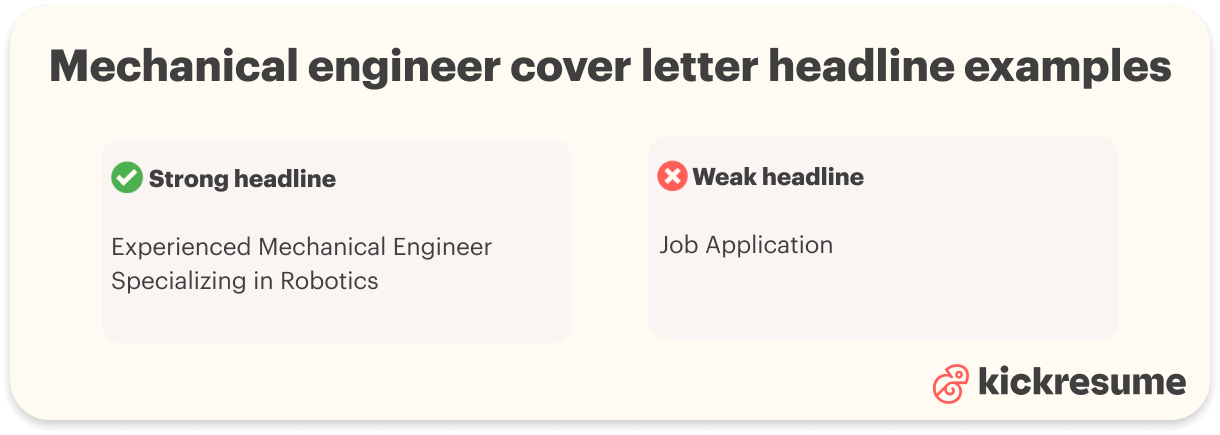
4. How to personalized the greeting in cover letter
Finding the right way to address your potential employer is more important than you might realize. A personalized greeting can demonstrate your attention to detail and your respect for the person reading your application.
To save your cover letter from landing in the common pile of "To Whom It May Concern", it's worthwhile doing a bit of detective work.
The job posting, the company's website, or LinkedIn might hold the key to finding the name of the hiring manager or the person responsible for sorting applications.
Personalized greeting examples
- Dear Mr. Johnson,
- Dear Mr. Jake Johnson,
- Dear Hiring Manager Jake Johnson,
Sometimes, despite your best efforts, you simply can't find a name. Don't fret. Default to using a generic but still professional sounding salutation such as:
- Dear Hiring Manager,
- Dear [Company Name] Team
Either way, the goal remains the same: make your greeting professional and respectful. This is your first chance to shine, don't let it go to waste.
5. How to write a compelling cover letter introduction
In the introduction of your cover letter, you should introduce yourself in a way that is compelling to employers and keeps them interested in reading further. A strong introduction will often include:
- A brief overview of your professional history
- A statement on why you are enthusiastic about applying to this company
- A mutual acquaintance (when possible)
Mutual acquaintances help to build rapport and credibility immediately, while also providing the employer with a trusted professional reference.
Pro tip: If you don't have any mutual acquaintances, try building your professional network with platforms like LinkedIn. By doing so, you can connect with employees and associates of the companies you are most interested in.
Bad cover letter introduction example
I am writing to apply for the Mechanical Engineer position. I believe I have the necessary qualifications and would like to formally submit my application.
Why is it weak? This example seems very generic. Rather than generalizing about possessing the "necessary qualifications", it would be much more beneficial to highlight specific skills or experiences that make the candidate the perfect fit for the Mechanical Engineer position.
Here's a good example of a mechanical engineer introduction
I am a Mechanical Engineer with 6+ years of experience in industrial manufacturing. As a member of the American Society of Mechanical Engineers, I have had the pleasure of meeting and collaborating with your Head Engineer, John Simmons. Mr. Simmons recently contacted me about this opening and recommended I apply, as my professional goals and values are aligned with your company’s.
Why is it effective? This example stands out with its personalized opening and relevant introduction of qualifications. The candidate effectively makes a connection by mentioning their relationship to John Simmons. The only small detail that could perhaps be optimized is the phrase "your company's", which could be replaced with the actual company name for an even more personalized approach.
Writing an impactful introduction to your cover letter requires a thoughtful approach.Highlighting your qualifications early on leaves a strong initial impression and stands you in good stead for consideration.
6. How to showcase your mechanical engineer accomplishments & skills
The next step is to write the biggest section of your cover letter — the body paragraphs. Most mechanical engineer cover letters will contain between 2 to 4 body paragraphs that answer the following key questions:
- What excites you about working at this company?
- What skills do you possess and how can you apply them at this company?
- What accomplishments or qualifications make you stand out as an applicant?
- How can you contribute to ongoing or future projects the company is involved in?
Focusing on your relevant skills and accomplishments is particularly important. Unlike a resume, a cover letter gives you ample space to provide specificity and context around these qualifications, so use this space wisely.
Here are 6 examples of key mechanical engineer skills for your cover letter
- Manufacturing processes
- Product development & testing
- Mechanical mathematics
- Computer design programs
- Creative problem-solving
- Clear communication
Remember, don’t just list these skills, but integrate them within the fabric of your narrative.
Here's an example of how to describe accomplishments
During my tenure at XYZ Engineering, I led a team in designing and developing a cutting-edge automotive component that improved fuel efficiency by 15%, resulting in substantial cost savings for our clients. Additionally, I successfully implemented a streamlined manufacturing process, reducing production time by 20% and saving the company $100,000 annually. My innovative approach and attention to detail have resulted in three patents for novel mechanical designs. I am eager to bring this same level of excellence and ingenuity to further enhance your organization's engineering capabilities.
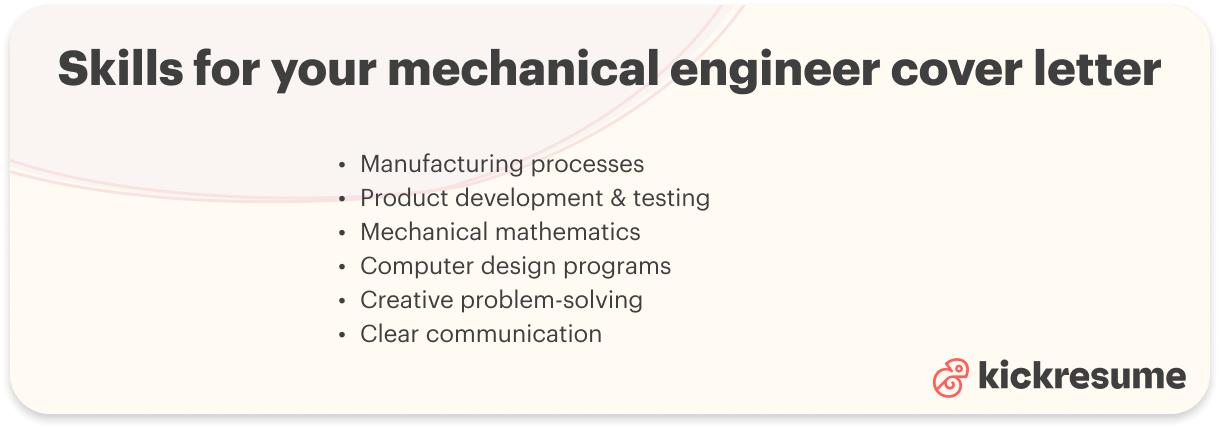
7. How to conclude your cover letter persuasively
Always finish a cover letter off strong with an effective closing statement that includes:
- An enthusiastic sentence saying you are looking forward to hearing from them
- An additional sentence stating you will follow up, including how you will contact them or how they can contact you
- A formal sign-off
Here are two contrasting examples portraying an ineffective and a more effective way to conclude your cover letter:
Bad cover letter conclusion example
Can't wait to hear from you! I've always dreamed about working at your company, so fingers crossed. You guys are just awesome. Don't forget to call me, okay?
TTYL,
[Your Name]
Here's what makes it less effective:
- The tone is far too casual. While it's helpful to be personable and friendly, this crosses over into being unprofessional.
- The statement, "You guys are just awesome," lacks specifics about why you're interested in the company. It feels generic and vague.
- The last sentence comes off as not merely friendly, but borderline intrusive, which might not be taken well by a recruiter or hiring manager.
- A professional sign off is missing and "TTYL" (Talk To You Later) might not be understood by everyone, particularly in a global work context.
Good cover letter conclusion example
I am beyond excited to be considered for this opportunity and greatly look forward to further discussing my skills and qualifications as a Mechanical Engineer. I am eager to speak with you and am available to meet any weekday from 7 a.m. to 4 p.m., and I plan to reach back out if I have not heard back by next Monday. The best way to reach me is at (123) 456-7890.
Best Wishes,
[Your Name]
Why does it work? The candidate’s enthusiasm resonates well, conveying genuine interest. Declaring one’s availability for any weekday demonstrates flexibility and eagerness to move forward. What’s more, the assertiveness with their promise to follow up reflects initiative.
In a nutshell, keeping professionalism intact goes a long way in leaving a positive impression on recruiters.
8. How to avoid common mistakes on a mechanical engineer cover letter
Avoiding some of the most common mistakes can help your cover letter stand out. Here are a few pitfalls to steer clear from:
- Vague language
- Mistake: "I have extensive experience in mechanical engineering."
- Fix: Use concrete examples to back up your claims, e.g., "In my 5-year tenure with ABC Corp, I led a team of engineers to redesign production processes, reducing mechanical failures by 30%."
- Skip the one-size-fits-all approach
- Error: Using the same cover letter for all job applications.
- Fix: Instead, tailor your cover letter for each job application. Identify the specific needs of the role and discuss explicitly how your skills and experiences relate to them.
- Evade overstatements
- Regular fumble: "I am the best Mechanical Engineer you will ever find."
- Fix: Rather than overly exaggerating your skills or qualifications, focus on factually presenting your key achievements and abilities. Modesty sprinkled with confidence is attractive.
- Beware of typos and grammatical errors
- Typical mistake: "I'm good at detail-oriented tasks," typed as "I'm good at detial-oriented tasks."
- Fix: Attention to detail is critical. Proofread your cover letter multiple times and consider having a trusted friend or mentor review it as well. Tools like Grammarly can also be helpful in catching errors.
- Don't oversell or undersell
- Frequent slip: Either focusing too much on what you can gain from the role, or underselling by not adequately highlighting your skills.
- Fix: Strike a balance. While it's vital to show how the role aligns with your career goals, it's equally important to demonstrate how you can add value to the company.
Remember, every touchpoint with a potential employer, including your mechanical engineer cover letter, shapes their perception of you. Making these minor adjustments can make a major difference.
9. Average salary and job outlook for mechanical engineers
The most recent data provided by the Bureau of Labor Statistics, BLS, in May 2022, indicated that the mean annual wage for mechanical engineers was $96,310.
This figure, however, can swing higher or lower depending on several factors like levels of experience, skills, and location.
As for the job outlook, mechanical engineering remains a solidly growing field. The BLS projects a substantial 10% employment growth within the mechanical engineering sector from 2022 to 2032. This rate is significantly faster compared to the average growth rate for all occupations.
Looking at the bigger picture, this translates into approximately 19,200 job openings for mechanical engineers projected every year, on average, over this ten-year period.
What this means for individuals in or entering the mechanical engineering industry is clear — there are continually expanding opportunities and a healthy paycheck within this field.
10. Mechanical engineer resources for job seekers
Navigating the job market as a mechanical engineer can feel like solving a complex thermodynamics problem without the right resources at hand. Here are some pointers to guide you:
- Tap into industry-specific learning resources: Whether you're a budding mechanical engineer or an experienced practitioner, upskilling by delving into specialized subjects within your industry can catapult your career. Platforms such as Coursera, edX, and Udemy can be your academic haven. Get certified in applicable courses to add value to your resume and garner an edge over your peers.
- Join professional organizations: Groups such as the American Society of Mechanical Engineers (ASME) and the National Society of Professional Engineers (NSPE) offer networking, continuing education, and job listings.
- Leverage LinkedIn: LinkedIn can be a goldmine of job opportunities. Keep your profile up-to-date and engage with posts within your field. Consider joining industry-specific groups on LinkedIn for the latest trends and job postings.
- Attend job fairs and industry events: Such events give you the chance to meet potential employers face-to-face, making them more likely to remember you when a job opportunity comes up.
- Enhance your skills: Continued learning is crucial in an ever-evolving field like mechanical engineering. Platforms like Coursera, edX, and Udemy offer profession-specific courses.
- Use career-specific job sites: Websites such as Engineer Jobs, Engineering.com job board, and ASME job board focus solely on engineering opportunities and often feature more niche jobs than general employment websites.
- Cultivate your online presence: Start a professional blog, join relevant conversations online, or contribute to open source projects — these efforts showcase your passion and knowledge to prospective employers.
Navigating your career path is significantly easier with the right tools and resources. Engaging robustly with the industry helps not only in job landing but also in staying abreast of emerging trends in your field.
Mechanical Engineer Cover Letter FAQ
Is it necessary to tailor my cover letter for each job application?
Absolutely. A bespoke cover letter signals to the employer that you understand their specific needs and can articulate how your skills and experiences align to meet those requirements. It also shows commitment and readiness to put in the effort, traits that are always in demand.
How relevant is networking in the job-hunting process for a mechanical engineer?
Enormously relevant. Although your skills and qualifications are essential, networking helps to expand your reach and can open up opportunities that might not be readily visible. Professional organizations, LinkedIn groups, industry events, and job fairs are excellent places to network.
If I am changing career paths to mechanical engineering, how should I highlight my previous experiences in my cover letter?
Identify transferable skills from your previous experience and draw parallels to the job you're applying for. For example, if your previous role involved complex problem-solving, this skill can be highlighted in your cover letter as it's an integral aspect of mechanical engineering.
Is there a noticeable difference in salaries between entry-level and experienced mechanical engineers?
Yes, experience can significantly influence your compensation in mechanical engineering. The BLS data typically represents a mean salary across various experience levels. As an engineer gains more experience and possibly specializations, they can command higher salaries than an entry-level engineer.
Are online courses a good way to enhance my skills as a mechanical engineer?
Certainly. Online courses are a fantastic way to broaden your abilities and keep up with the cutting-edge developments in the field. Whether you're expanding on foundational knowledge or delving into a new sub-discipline, online learning platforms can be a valuable resource.


